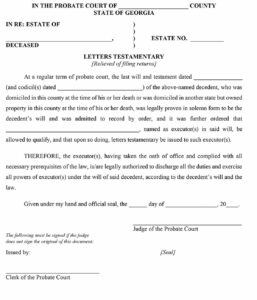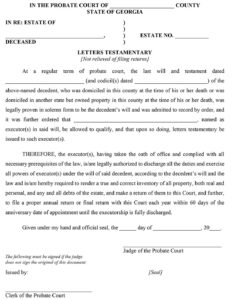When it comes to managing the affairs of a deceased individual’s estate, the legal aspects can be complex and challenging to navigate. One key document that plays a crucial role in this process is the Letter of Testamentary (LOT).
A Probate Court issues this legal document and gives the Executor the authority to handle and distribute the deceased person’s assets according to their wishes.
Read further to find out what are Letters of Testamentary, their importance, and the process of obtaining them, especially in states like Georgia with stringent probate laws.
What Is a Letter of Testamentary?
A Letter of Testamentary is a formal document issued by a Probate Court. It appoints the Executor to represent the estate.
Once the will is probated and the Executor is appointed, the Executor receives Letters of Testamentary, which show his powers to accomplish the wishes expressed in the will.
Without Letters Testamentary, the Executor cannot communicate with financial institutions’ creditors or transfer or sell estate assets, including real estate. It serves as the Executor’s ultimate tool, ensuring that they fulfill their duties responsibly and in alignment with the deceased’s intentions.
Letters of Testamentary in Georgia definition
In Georgia, the letters of testamentary conserve the same meaning as in most other states in the U.S. Having a will does not exempt someone from the probate process.
The probate process in Georgia involves several steps, and obtaining letters of testament is usually the first step in settling the estate.
How to Get Letters of Testamentary?
A will must be probated in court to obtain the letters of testament. In Georgia, the probate procedure consists of three key phases: Appointment, Administration, and Distribution.
Usually, the issuance of letters of testamentary occurs during the initial phase – Administration.
Before going to the Court, it is good practice to have the will reviewed by an experienced probate attorney to ensure it meets the Court’s required criteria.
If the will meets the requirements
In this scenario, the named Executor will petition the Court to probate the will, and he will be appointed Executor.
If the will doesn’t meet the requirements
In such a situation, the Probate Court will ask for additional documentation and information to continue probating the will.
Some common cases when the Court asks for more documents are:
- The deceased wrote the will many years ago; meanwhile, the Georgia laws changed, and the will does not follow the current laws.
- A person wrote his will when living in another state but passed away in Georgia. And the will was created under the standards of the respective state, which are different in Georgia.
- Another particular situation. In complex cases, having a Probate Lawyer assist you is recommended.
For the Executor to become appointed, he will send out paperwork to the estate’s heirs to let them know that the will is being probated. In this phase, they can contest the will if they disagree with its content or the named Executor.
When all the parties have signed off properly on the paperwork, and there are no contestations, the petition is filed with the Court, which will process it.
Next, the Executor will take an oath at the Probate Court. This oath is swearing to uphold the will and follow the laws an Executor must abide by.
If the Court accepts the petition, the Executor is appointed over the estate, and the Letters of Testamentary are issued. At that time, the will’s beneficiaries are contacted to inform them that the estate has been opened and an Executor has been appointed.
How Long Does It Take to Get a Letter Of Testamentary?
The time it takes to obtain Letters of Testamentary can vary based on several factors, including:
– County in which the probate is processed. Larger, more populated counties with busier Probate Courts may take longer to handle the petition.
– The number of heirs and beneficiaries involved. Prompt and accurate cooperation from heirs and beneficiaries can expedite the process.
– Location of beneficiaries and heirs. When multiple heirs and beneficiaries live in different locations around the U.S. or out of the country, it can take longer to reach each person to request the documents’ signatures.
The process gets more complex when heirs and beneficiaries live outside the U.S. It may take longer as there are specific procedures for the paperwork to be notarized by a U.S. notary.
– Family disputes or objections to the will can significantly delay the probate process. If someone refuses to sign off on the will and has to be served by the Court to give them a deadline to respond, receiving Letters of Testamentary will take longer.
If someone files an objection to the will being probated, the entire probate process is put on hold until the objection can be handled. The probate process can proceed once the Probate Court has settled the objection.
In simple estate situations with few heirs or beneficiaries, when there are no disputes, and the will meets the required criteria of the Court, it usually takes about 3-6 months to be appointed Executor and receive a Letter of Testamentary.
How Much Does a Letter of Testamentary Cost?
The cost of obtaining Letters Testamentary can vary depending on location, the nature of the estate, and legal fees. It includes court fees for filing probate documents and attorney fees. Each county has a filing fee associated with filing the petition to probate.
To determine the specific costs in your area, consult local Courts or legal professionals for detailed information tailored to your situation.
Why Would You Get a Letter From a Probate Court? Can You Get a Letter of Testamentary Without Probate?
You must go through the probate process before obtaining a Letter of Testamentary.
This document results from the probate process, signifying the Court’s approval of the will and granting legal authority to the Executor. The Court issues Letters of Testamentary once the named Executor has submitted a petition to the Court and received court approval.
Do I need a lawyer to get a letter of testamentary?
No, you don’t, but it’s recommended, particularly in complex cases.
Hiring legal counsel can significantly simplify the process, ensuring that all requirements are met accurately and efficiently. Legal professionals experienced in estate planning and probate can provide tailored guidance and support throughout the process, giving both heirs and Executors confidence in their actions.
How to Get a Letter of Testamentary Without A Will?
If the deceased person did not leave a will, the family will choose a person to handle the estate. This person will attempt to be appointed Administrator of the Estate. In such cases, the Court will appoint an administrator. The legal document granted will be called a “Letter of Administration,” the equivalent of a Letter of Testamentary.
If the deceased passed without a will, there may be another option for the family to settle the estate without appointing an Administrator and going through the probate process.
It is called No Administration Necessary and can be a quicker and less expensive way to settle the estate if specific conditions are met.
Letter of Testamentary vs. Letters of Administration.
When someone dies without leaving a will, their estate enters the intestacy process. In such cases, the Court appoints an Administrator rather than an Executor, and the legal document granted is called a “Letter of Administration.”
This document serves a similar purpose to a Letter of Testamentary but is specific to cases without a will. It grants the administrator the legal power to manage the deceased person’s assets and affairs, following state laws.
Do You Need a Letter of Testamentary If You Have a Will?
Having a will does not automatically grant legal authority to manage an estate. A Letter of Testamentary is necessary to provide the Executor with the power to fulfill the deceased person’s wishes and ensure the legal and fair distribution of assets to beneficiaries.
Depending on the type of asset, you may not need a Letter of Testamentary. There are two primary types of assets to consider when dealing with a deceased individual’s estate:
1. Probate Assets: Assets owned by the person who passed away that do not have another person listed as a beneficiary or co-owner. Dealing with the deceased person’s probate assets requires obtaining a Letter of Testamentary from the Probate Court.
2. Non-Probate Assets: These are assets belonging to the deceased person with a specific beneficiary or co-owner listed. In such cases, the named beneficiary or co-owner can directly claim these assets from the institution holding them without the need for Letters of Testamentary.
Do You Need a Letter of Testamentary with a Trust?
It depends on the situation. If the deceased-owned assets are not titled into the trust, then Letters of Testamentary may be required to administer those assets properly.
Letter of Testamentary Example. What Does a Letter of Testamentary Look Like?
Check below an example of LOT Not relieved of filing returns and one of LOT Relieved of filing returns.

Take Away
If you need further help obtaining Letters Testamentary, please ask for a consultation or call our office at (770) 796-4582. Our experienced probate lawyers can guide you to get faster the necessary legal documents.
Frequently Asked Questions:
1. What is another name for a letter of testamentary?
Another term is “grant of probate” or simply “probate.”
2. What are testamentary duties?
Testamentary duties refer to the responsibilities of the Executor named in a will. These duties include managing the deceased individual’s estate, paying debts, distributing assets to beneficiaries according to the will’s instructions, reporting, and discharge.
3. Who issues Letters Testamentary in Georgia?
In Georgia, the county’s probate court where the person who passed away lived gives out letters of testamentary.
4. How do I get a Letter Of Testamentary in Georgia?
In Georgia, getting LOT involves:
- Submitting the deceased person’s will to the probate court.
- Filing a probate petition.
- Informing relevant parties.
- Attending a probate hearing.
- Taking an oath at the Court.
When the will is validated, the Court grants the letters testamentary to the chosen Executor.
More information
Disclaimer These websites have not been reviewed by Georgia Probate Law Group and are not endorsed or even recommended by Georgia Probate Law Group. These websites are additional resources that you can use to further your general education on this topic.
Disclaimer: The information above is provided for general information only and should not be considered legal advice. Our probate attorneys provide legal advice to our clients after talking about the specific circumstances of the client’s situation. Our law firm cannot give you legal advice unless we understand your situation by talking with you. Please contact our law office to receive specific information about your situation.





























